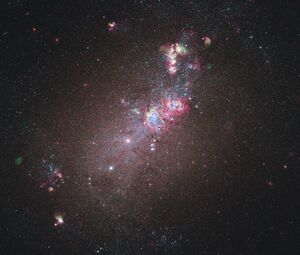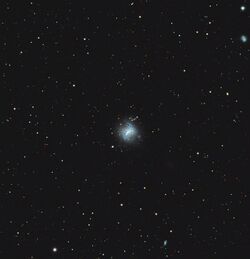Astronomy:NGC 4214
| NGC 4214 | |
|---|---|
 Optical and near-infrared image, taken using the Hubble's Wide Field Camera 3 (WFC3) | |
| Observation data (J2000 epoch) | |
| Constellation | Canes Venatici |
| Right ascension | 12h 15m 39.2s[1] |
| Declination | +36° 19′ 37″[1] |
| Redshift | 291 ± 3 km/s[1] |
| Apparent magnitude (V) | 10.2[1] |
| Characteristics | |
| Type | IAB(s)m[1] |
| Apparent size (V) | 8.4′ × 6.6′[1] |
| Other designations | |
| NGC 4228, CGCG 187-32, IRAS 12131+3636, KUG 1213+366, MCG 6-27-42, UGC 7278,[1] PGC 39225[1] | |
NGC 4214 is a dwarf barred irregular galaxy located around 10 million light-years[2] away in the constellation Canes Venatici. NGC 4214 is a member of the M94 Group.
Characteristics
NGC 4214 is both larger and brighter than the Small Magellanic Cloud[3] as well as a starburst galaxy, with the largest star-forming regions (NGC 4214-I and NGC 4214-II) in the galaxy's center. Of the two, NGC 4214-I contains a super star cluster rich in Wolf-Rayet stars and NGC 4214-II is younger (age less than 3 million years), including a number of star clusters and stellar associations.[4]
NGC 4214 also has two older super star clusters, both with an age of 200 million years and respective masses of 2.6*10.5 and 1.5*106 solar masses.[5]
Two satellites are known to exist around the vicinity of NGC 4214. One is DDO 113, which has an absolute V-band magnitude of −12.2. It stopped star formation around 1 billion years ago. Another, more recently discovered object is MADCASH-2, officially named MADCASH J121007+352635-dw. The name refers to the MADCASH (Magellanic Analog Dwarf Companions and Stellar Halos) project. It is similar to typical ultra-faint dwarf galaxies, with an absolute V-band magnitude of −9.15, except in that it shows evidence of multiple episodes of star formation in its recent past: one around 400 million years ago, and another 1.5 billion years ago.[6]
Two supernovae have been observed in NGC 4214: SN 1954A (type Ib, mag. 9.8),[7] and SN 2010U (type LBV, mag. 15.7).[8][9]
See also
- NGC 4236 - a similar irregular galaxy
References
- ↑ 1.0 1.1 1.2 1.3 1.4 1.5 1.6 1.7 "NASA/IPAC Extragalactic Database". Results for NGC 4214. https://ned.ipac.caltech.edu/uri/NED::ByName/NGC%204214.
- ↑ "Galaxy NGC 4214: A star formation laboratory". ESA/Hubble Photo Release. ESA/Hubble. http://www.spacetelescope.org/news/heic1109/.
- ↑ Karachentsev, Igor D.; Karachentseva, Valentina E.; Huchtmeier, Walter K.; Makarov, Dmitry I. (2003). "A Catalog of Neighboring Galaxies". The Astronomical Journal 127 (4): 2031–2068. doi:10.1086/382905. Bibcode: 2004AJ....127.2031K.
- ↑ Ubeda, L.; Maíz-Apellániz, J.; MacKenty, J. W.. Massive Young Star Clusters in NGC 4214. 322. pp. 221. Bibcode: 2004ASPC..322..221U.
- ↑ "Dynamical Mass Estimates for Five Young Massive Stellar Clusters". The Astronomical Journal 128 (5): 2295–2305. 2004. doi:10.1086/424538. Bibcode: 2004AJ....128.2295L.
- ↑ Carlin, Jeffrey L.; Mutlu-Pakdil, Burçin; Crnojević, Denija; Garling, Christopher T.; Karunakaran, Ananthan; Peter, Annika H. G.; Tollerud, Erik; Forbes, Duncan A. et al. (2021). "Hubble Space Telescope Observations of Two Faint Dwarf Satellites of Nearby LMC Analogs from MADCASH". The Astrophysical Journal 909 (2): 211. doi:10.3847/1538-4357/abe040. Bibcode: 2021ApJ...909..211C.
- ↑ Transient Name Server entry for SN 1954A. Retrieved 28 March 2023.
- ↑ Transient Name Server entry for SN 2010U. Retrieved 25 March 2023.
- ↑ Central Bureau for Astronomical Telegrams No. 2163.
External links
- Hubble Heritage site: Detailed information on the HST picture of 4214
- Galaxy NGC 4214: A star formation laboratory ESA/Hubble photo release
 |


